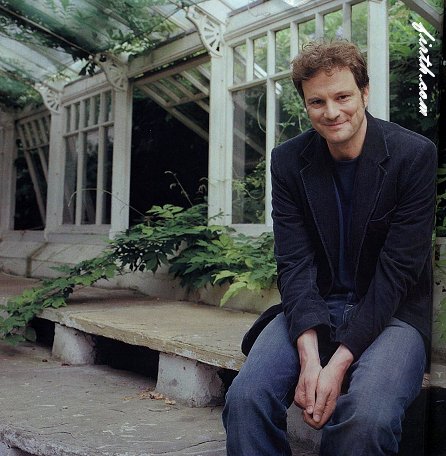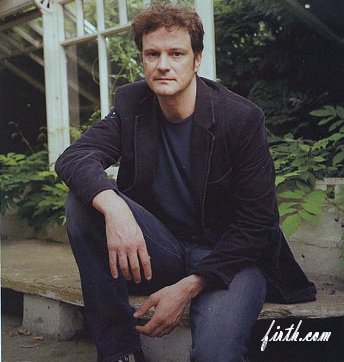Celebrity interview
Firth Among Sequels
|

|
Jokes aside, Colin
Firth, 44, seriously stole the hearts of women worldwide with his
portrayal of Mr Darcy in the BBC’s 1995 version of Pride and Prejudice, and has
furthered his romantic-hero credentials by playing Mark Darcy in Bridget Jones’s Diary and the
sequel, Bridget Jones: The Edge of
Reason, as well as Vermeer in Girl
With a Pearl Earring and a cuckolded writer in Love Actually. Married to Livia
Giuggioli, he has two children, Luca, 3, and Mateo, 1, and a son, Will,
13, from his relationship with actress Meg Tilly.
Playing Darcy in Pride and
Prejudice propelled you into the fantasies of millions of women—how did
you cope with that?
It came as something of a surprise after more than 10 years in the job!
I thought it was all going very well—I was constantly in work and
playing lead roles in reasonably high-profile projects—then it hit
another level in terms of the response from female fans. It was a
complete bolt from the blue—I certainly didn’t expect it from a TV
series. And the name Darcy is something I’m stuck with forever. If I
became an astronaut tomorrow and the first to land on Mars, the
headline would be, “Mr Darcy Lands On Mars”. It doesn’t matter what
else I do, this tag will stay with me, but there are worse things. It’s
wonderful to have made an impact playing anybody in your life, so I can
live with it.
Do people often call you Darcy
instead of Colin?
Not really—only journalists when they write about me. But certainly
nobody in my family calls me that. Names are a huge part of who you
are, but Colin doesn’t have a glamorous ring to it. It’s the kind of
name you give your goldfish as a joke. It has the double disadvantage
of being considered commonplace and dreary but at the same time not
being common at all. There are very few Colins around; no kings called
Colin, no poets or writers I can think of; very few heroes in stories
are called Colin. Yet my parents called their first-born son Colin and
I’ve never had a satisfactory explanation as to why they would do that.
Apparently there are high suicide rates among people who have comical
names. I discovered this in some article—people whose first initial is
P with the surname Nuts, they kill themselves. It’s obviously not, “I
have a silly name, I must kill myself,” but it happens after years of
identifying yourself in a certain way.
In the book Bridget Jones: The Edge of Reason,
Bridget meets you in real life. How did they cover that in the film,
since you were already playing another character?
I don’t think they were ever going to go that way in the movie, but if
they had, I expect they would have had to get somebody like Russell
Crowe to play me.
What did you think of all the
fuss made in the press when Renée Zellweger—an American—was
chosen to play the very British Bridget?
I never thought much about where Renée came from, any more than
I ask any other actor where they come from. I think the English make a
fuss about these things and I’m never quite sure why. It’s very common
for English people to play Americans and I’ve never seen the American
press get up in arms about it. If we did nothing but play ourselves and
people from our own background, we would have a very dull film business.
The papers also went to town on the fact
that Renée had to gain weight for the role, didn’t they?
It’s a kind of malaise that has spread right across the Western world
and is particularly bad in LA—women are expected to be
unhealthily thin.
Do you think a successful man
like Mark Darcy could really fall for an insecure, clumsy woman like
Bridget?
Actually, I find Bridget an extremely attractive character, partly
because of all her disasters. I don’t see why men shouldn’t fall for
women like that, I think they can often be charming. People who are
radiant, successful winners aren’t necessarily attractive; it can be
quite the opposite—vulnerability can be very appealing.
What do you find most attractive
in women?
I don’t have a particular template—it’s 100% case by case. A certain
level of intelligence helps, and I think almost everyone finds humour
appealing and the lack thereof not very appealing.
What do you find baffling about female
behaviour?
The list is fairly endless. I think men and women are probably very
similar and that far too much is made of the differences, but having
said that, there will always be an enigma to the relationship between
the sexes, which I think is insoluble. We’ll never reach a perfect
understanding and I can’t really imagine it being desirable to do so,
because it’s kept alive by mystery.
Are you a romantic?
Yes, I suppose I am, as much as anybody is. I think in any real
relationship there are elements other than romance that drive it. I do
think it’s very important to keep the lyrical element in your life
though, and it’s up to storytellers, films and songs to keep us engaged
with that. If romance is simply going from thrill to thrill, whether
it’s partner to partner or poem to poem or song to song, I’m sceptical
of it, but I think it’s important and it’s probably something that is
endlessly renewable.
What do you consider romantic?
I think it’s very romantic to learn someone’s language and travel a
long way to propose to them, try to win their parents over and all
that. I think that qualifies absolutely; it certainly does in cinematic
terms. I did it in Love Actually
with the Portuguese girl, but I did something similar in real life. I
married someone whose first language wasn’t English and got on a plane
to propose.
Having an Italian wife, you must have
noticed certain differences between Brits and Italians?
The more I travel, the more I see cultural stereotypes broken down.
We’re led to believe that there’s no such thing as a repressed
Italian—they’re some of the most repressed people I know. And I’m not
sure who the stereotypical English man is; are we talking about Mick
Jagger or John Lennon or Johnny Rotten? We produce rock stars all the
time, yet we still have this fixed image of an Englishman as somebody
like John Major.
Have the cultural differences affected your
marriage?
Of course. There are language differences, and although we speak each
other’s well enough to communicate, they still lead to
misunderstandings. These are certain views we’re destined to differ on,
but they’re stimulating rather than restrictive. The English love the
Italians, and the Italians don’t entirely despise the English, even
though they find us a little ridiculous at times.
How did it feel to become a
father again at 40?
I’m just better equipped for it now. I won’t go into a lot of detail
about my children or family life, but it takes a long time for some of
us boys to grow up. At 30, I still felt far too young for anything like
that—I hadn’t quite got over not being 18 anymore and it changed my
life dramatically. Obviously I fell passionately in love with my child
and my priorities changed—I think that’s true of everybody. The second
time, I did feel old enough finally and a little more equipped for it,
but in some ways it’s an almost identical experience.
Is your wife’s Italian approach
to motherhood different?
Yes, but I think the more you get to know someone from a different
culture, the more you realise those differences are fairly
inconsequential. It’s much more to do with who she is than the fact
that she’s Italian, because often I’ll assume that something she’s
doing or thinking is because she’s Italian, but her best friend or
sister will think something completely different. Certainly her Italian
family operates very much as a clan around a newborn child—for the
first three months of my babies’ lives, if I wanted to see them, I had
to book an appointment with the rest of the family—all the uncles and
the aunts. I had to join the queue.
 Who
were your idols when you were growing up? Who
were your idols when you were growing up?
Mostly pop stars and one or two teachers. I had an English teacher, Mrs
Kirby, who set literature on fire for me. She broke down the formality
of it and made it fun. There was also Mr Pines. At the age of 9, I
suddenly realised this was a man full of humour who actually loved
kids, which is not true of all teachers. He made even chemistry seem
interesting. I think a lot of very young people need older people to
show them respect and that’s often something they don’t get.
Do you find people jealous of
your success?
It’s difficult to spread your success around and I think it takes a
particular sensibility in others to accept it generously, to wish you
well. It’s not jealousy necessarily, it’s a lack of understanding, and
some people might also question their own importance. If you were
always scatty about returning phone calls before you became an actor,
that was just because you were scatty; afterwards, people might see it
as you thinking you’re too good for them. But I do think that a
creative process, and anything that has to do with being public, is
often quite isolating.
|

